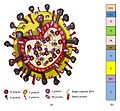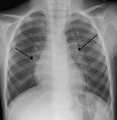Respiratory syncytial virus facts for kids
Human respiratory syncytial virus (RSV) is a common virus that causes infections in the lungs and breathing passages. These are often called respiratory tract infections. RSV is a major reason why babies and young children get lung infections and sometimes need to go to the hospital.
Contents
What is RSV?
RSV is a type of germ that can make people sick, especially during certain times of the year. It mostly affects the lungs and airways, which are the tubes that carry air in and out of your body. For most healthy people, RSV might feel like a common cold.
Who Does RSV Affect?
While anyone can get RSV, it is most serious for babies and very young children. Their lungs are still developing, so the virus can cause more severe problems. Older adults and people with weak immune systems can also get very sick from RSV.
How Does RSV Spread?
RSV spreads easily from person to person. It travels through tiny drops that go into the air when someone who is sick coughs or sneezes. You can also catch RSV by touching surfaces that have the virus on them, like doorknobs or toys, and then touching your face.
What Are the Symptoms?
Symptoms of RSV usually appear about 4 to 6 days after someone gets infected. They can include:
- A runny nose
- A cough
- Sneezing
- A fever
- Wheezing (a whistling sound when breathing)
For babies and young children, RSV can sometimes lead to more serious conditions like bronchiolitis (swelling of the small airways in the lungs) or pneumonia (a lung infection).
How is RSV Treated?
There is no specific medicine to cure RSV, but doctors can help manage the symptoms. Most people recover on their own. For severe cases, especially in babies, hospital care might be needed to help with breathing and hydration. This could involve giving oxygen or fluids.
Can RSV Be Prevented?
Yes, there are ways to help prevent RSV. Good hygiene, like washing your hands often with soap and water, is very important. Avoiding close contact with people who are sick can also help. For some babies who are at high risk, doctors can give a special medicine to help prevent severe RSV infection. This medicine is usually given before the baby is born or shortly after birth.
Images for kids
See also
 In Spanish: Virus respiratorio sincitial humano para niños
In Spanish: Virus respiratorio sincitial humano para niños
 | Georgia Louise Harris Brown |
 | Julian Abele |
 | Norma Merrick Sklarek |
 | William Sidney Pittman |







